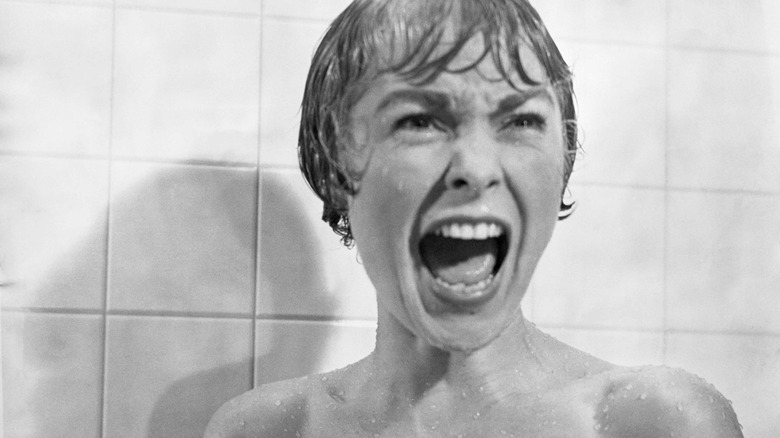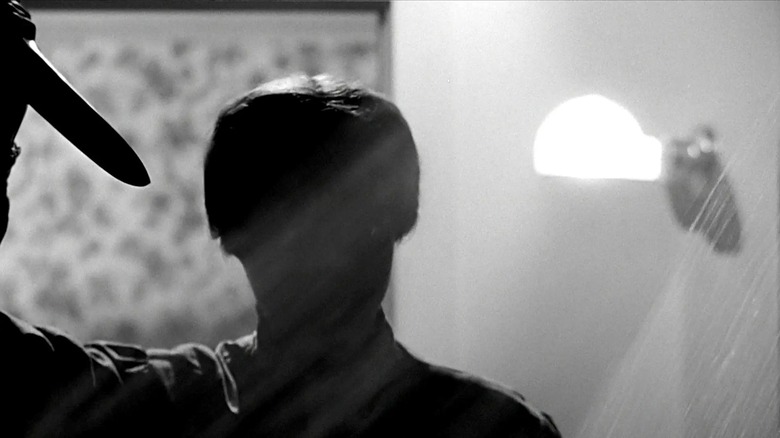Marion Crane's Death In Psycho Had Janet Leigh Avoiding Showers For Years
Spoilers for "Psycho" to follow.
Alfred Hitchcock's "Psycho" created a watershed moment in American cinema when it was released in 1960, setting an unforgettable precedent for the slasher genre and the portrayal of shocking violence and complex psychosexual deviance on the big screen. There is a palpable edge to "Psycho" that has served as a blueprint for slasher-thrillers down the line, where the violence is sudden and shocking, with the examination into minds like that of Norman Bates' (Anthony Perkins) conveyed in unabashedly visceral and layered terms. Although "Psycho" is designed to keep us on the edge of our seats, as Hitchcock utilizes his mastery over suspense to sustain that sentiment throughout, the shower scene is still considered one of the most jarring scenes where a character dies when least expected.
Janet Leigh stars as Marion Crane, a woman on the run who takes shelter at the Bates Motel when her plans to meet her lover Sam (John Gavin) are thwarted after getting stuck in a storm. Janet's primary concern is to reach Sam because she has stolen $40,000 in cash from her employer to help him clear his debts, leaving her firmly on edge about getting caught. After some internal turmoil, she comes to terms with her actions while staying at the hotel and decides to do the right thing — she acknowledges her morally dubious act of theft and resolves to head home and return the money after the storm abates. However, to her horror (and ours), she is brutally stabbed in the shower, with Bernard Herrmann's anxiety-inducing theme (a last-minute addition to "Psycho") punctuating every stab wound.
Leigh would later speak to Ed Gross about filming this scene, discussing how its storyboard was thoroughly mapped and admitting that she never looked at showers the same way ever again.
A truly unforgettable scene
One of the reasons why Marion's death feels so disturbing is that it completely defies expectations. The film opens with Leigh, and we follow her closely while being privy to her moral tussles and her decision to do the right thing, so her untimely death feels sudden and shocking. Why would the perpetrator, who seemingly looks like an old woman, senselessly kill Marion without reason moments after she decides to right her wrongs? Hitchcock captures the uncomfortable, intimate violence of the scene with close-ups and quick cuts, with the knife plunging repeatedly while a terrified, vulnerable Marion shrieks in horror. Even after Marion's death, the intensity of what occurred stays with us even after the focus shifts to Bates and his emotional landscape.
In her interview with Gross, Leigh touched on the "unconventional" nature of the role, where a woman struggling with her morality is robbed of the opportunity to start anew, as the shower, a symbolic "cleansing," is interrupted by an act of violence leading to her death. The memory associated with shooting the scene stayed with Leigh, and instilled a fear of showers:
"I stopped taking showers and I only take baths. And when I'm someplace where I can only take a bath, I make sure the doors and windows of the house are locked. I also leave the bathroom door open and shower curtain open. I'm always facing the door, watching, no matter where the shower head is."
As if this lingering trauma wasn't enough, Leigh also had to deal with some disturbing fan letters after "Psycho" (a film that Hitchcock never regarded as particularly "serious") was released, with people threatening her with the same violence that Marion had experienced in the film. "Luckily nothing ever happened," Leigh stated in the 1984 interview.

